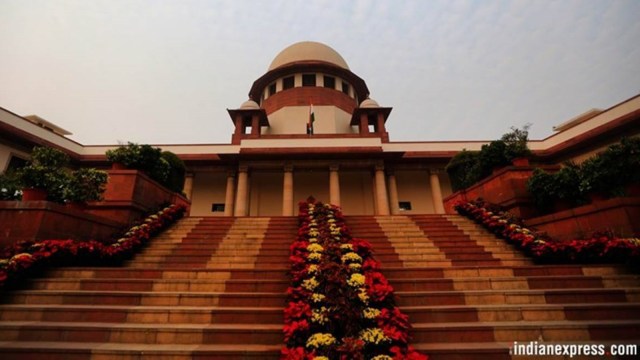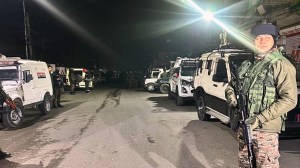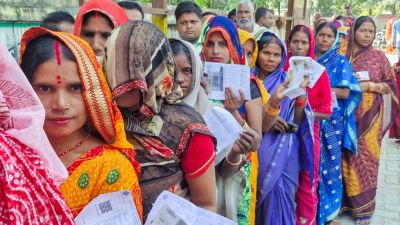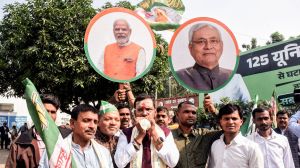Observing that “facts and circumstances of a crime committed, or an FIR registered, is not to be elicited from the Advocate who represents the accused, which again is a reflection of the abject failure of the investigating agency”, the Supreme Court Friday issued a series of directions to ensure that lawyers are not summoned by investigating agencies in a case involving their client unless exceptions laid out in the Bharatiya Sakshya Adhiniyam (BSA) are satisfied.
The bench of Chief Justice of India B R Gavai and Justices K Vinod Chandran and N V Anjaria said, “It is for the investigator to obtain independent evidence of the culpability of the accused. The position of trust the Advocate occupies vis-a-vis his client cannot be put to test by an attempt to breach the professional confidence, conferred with a solemn privilege under Section 132 (of BSA); which has reflections of the constitutional protection against self-incrimination.”

The question was referred to the three-judge bench by a two-judge bench in an appeal against a Gujarat High Court order which refused to quash a summons issued by the state police to a lawyer in a loan dispute case. During the pendency of the matter, there was also an uproar over the Enforcement Directorate summoning two senior lawyers in connection with investigations against their clients, following which intervention applications were filed by various Bar bodies and the Supreme Court initiated a suo motu case. The reference and the suo motu case were heard together.
Story continues below this ad
Following the uproar, the ED withdrew the notices to the lawyers. Friday’s judgement noted that “even though, the said issue, died down, there is prevalence of the police and investigating agencies under the special enactments, summoning Advocates who appear for the accused taking recourse to the provisions under the BNSS, which per se, is illegal, since any privileged communication under Section 132 cannot be disclosed without the consent of the client”.
The bench set aside the summons by the Gujarat police, “cautioning gallant Investigating Officers from transgressing impulsively, the privilege under Section 132, which could result in violating the statutory provision and more importantly result in the infringement of the fundamental rights guaranteed to the person whom the Advocate represents, by the Constitution of India.”
It found the reasons given by the High Court to not interfere with the summons as “flawed and erroneous” and “in abdication of the inherent powers conferred on the High Court, which the blatant breach of the rule against non-disclosure projects”.
Writing for the bench, Justice Chandran said, “We cannot but express our anguish in the investigating agencies summoning Advocates appearing in a case, in furtherance of the investigation of the said case.” The bench said that “the power to summon under Section 175 & 179 is not the power to interfere with the privileged communications between a lawyer and client, as long as the Constitutional Courts sit, in this country.”
Story continues below this ad
Disposing of the suo motu case, the bench said, “The role of lawyers in society and the discharge of their duties in prosecution or in defence, in establishing rights or defending against infringements, cannot at all be discounted. This is the reason why Section 126 in the Evidence Act was introduced and by Section 132, the said privilege, was retained in the BSA, protecting the communications between a lawyer and a client as sacrosanct, ensuring every opportunity as available in the legal firmament to the client the lawyer represents, and ensuring that no prejudice is caused to the accused he represents; a fundamental tenet of criminal jurisprudence. The sublime and profound role carried out by the Advocates in civil society cannot be disputed or discounted.”
Issuing directions, it said, “Section 132 is a privilege conferred on the client, obliging an Advocate not to disclose any professional communications, made in confidence, which privilege, in the absence of the client can be invoked by the Advocate on behalf of the client” and “the Investigating Officers in a criminal case or a Station House Officer conducting a preliminary inquiry in a cognizable offence shall not issue a summons to an Advocate who represents the accused to know the details of the case, unless it is covered under any of the exceptions under Section 132.”
The judgement said that “when a summons is so issued to an Advocate, under any of the exceptions, it shall explicitly specify the facts on which the exception is sought to be relied upon, which shall also be with the consent of the superior officer not below the rank of a Superintendent of Police who shall record his satisfaction as to the exception in writing, before the summons is issued” and it shall be subject to judicial review at the instance of the Advocate or the client under Section 528 of the BNSS.
It said “the Advocate on whom there is an obligation of non-disclosure as per Section 132 of the BSA shall be one who is engaged in a litigation or in a non-litigious or a pre-litigation matter”.
Story continues below this ad
The bench said that “production of documents in the possession of the Advocate or the client will” however “not be covered under the privilege conferred by Section 132, either in a civil case or a criminal case”.
On an investigating officer seeking production of a digital device under Section 94 of the BNSS, it said “the direction shall only be to produce it before the Jurisdictional Court.”
“On production of the digital device by the Advocate before the Court, the Court shall issue notice to the party with respect to whom the details are sought to be discovered from the digital device and hear the party and the Advocate on any objection regarding the production of the digital device, discovery from it and the admissibility of that discovered. If the objections are overruled by the Court, then the digital device shall be opened only in the presence of the party and the Advocate, who will be enabled due assistance of a person with expertise in digital technology, of their choice. While examining the digital device, care shall be taken by the Court not to impair the confidentiality with respect to the other clients of the Advocate and the discovery shall be confined to that sought by the Investigating Officer, if it is found to be permissible and admissible,” the judgment said.
It clarified that “in-house counsel will not be entitled to the privilege under Section 132 since they are not Advocates practising in Courts as spoken of in the BSA” but “would be entitled to the protection under Section 134 insofar as any communication made to the legal advisor of his employer, which however, cannot be claimed for the communications between the employer and the in-house counsel.”

































